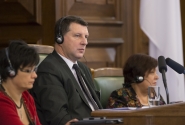
On Friday, 29 November, Raimonds Vējonis, President of the Baltic Assembly addressed the participants of the 32nd Session of the Baltic Assembly and the 19th Baltic Council, pointing out that the success of the three Baltic States depends on closer cooperation between the parliaments and the executive power, streamlining of the decision-making procedures and joint strategies for issues that cannot be efficiently solved individually.
Vējonis explained to the audience that the basic principle of the Baltic cooperation is quite simple, but it requires efficient coordination between the parliaments and the executive power in order to achieve the goal of boosting the region’s competitiveness. He also noted that it is proper to celebrate achievements, but it is equally important to openly discuss unresolved problems. He added that the parliamentarians’ contribution sometimes fails to evolve beyond recommendations or declarations simply because of the inefficient cooperation on the executive level.
We have made progress in combating tax fraud, the Baltic Assembly has unremittingly recognised the importance of the RailBaltic/RailBaltica project and the need to strengthen the region’s energy independence; however, the lack of progress in these principal areas clearly indicates that there are weaknesses in cooperation between the Baltic Assembly and the Baltic Council of Ministers, said Vējonis.
The President of the Baltic Assembly acknowledged awareness of the time and resources required by the executive power to carry out its daily tasks, given the challenges various sectors are facing in the current economic and social environment; however, he stressed that the executive power cannot afford to merely deal with the problems as they arise but should rather focus on strategic areas of the region’s development and cooperation.
“In this context I would like to draw your attention to the cooperation within the Baltic Council of Ministers, where, I believe, there is much room for improvement. It is my conviction that the cooperation between the line ministries should be further strengthened,” said Vējonis, adding that the Baltic Assembly managed to swiftly adopt a new format of functioning and develop practical partnerships in areas such as Baltic cooperation in health care, combating of VAT fraud at the European level and improving the legal framework for the supervision of financial markets.
Recently the Baltic Assembly and the Baltic Council of Ministers succeeded in agreeing on trilateral cooperation in finding joint solutions for repercussions of the economic crisis. “We cannot underestimate the importance of this agreement or take it for granted, for it is proof of our ability to come to an agreement and, albeit slowly, to move forward and attain the goal of strengthening the position of the Baltic States in the European Union as democratic, prosperous and reliable countries,” said Vējonis.
On Friday, 29 November the Saeima hosts the 32nd Session of the Baltic Assembly, where topics such as strengthening cooperation in the tourism sector, science, research and innovation, combating of organised crime, as well as the creation of a digital single market are scheduled to be discussed.
The President of the Baltic Assembly and Daniels Pavļuts, Minister for Economics of the republic of Latvia, who represented the Baltic Council of Minitesrs, within the framework of the 19th Baltic Council, which is the cooperation platform for Baltic parliaments and the executive powers, signed a Joint Statement thus agreeing on further cooperation in areas such as harmonisation of positions regarding the Eastern Partnership and protection of the common interests within the European Union, especially in the agricultural and tourism sector. Furthermore, the Joint Statement includes an agreement to cooperate in jointly seeking the most appropriate ways to diversify natural gas supplies to the region, implementing the Baltic Energy Market Interconnection Plan (BEMIP), as well as cooperation in the area of research and innovation and within the framework of energy infrastructure projects of regional importance.
The Baltic Assembly is an inter-parliamentary cooperation organisation of Latvia, Estonia and Lithuania established with the aim to coordinate Baltic cooperation on parliamentary level, to address joint issues and projects, as well as to express joint opinion on political, economic, social and culture issues in the European Union and globally. The Baltic Assembly consists of 12 to 20 members from each country’s parliament.
The Baltic Council is a platform for cooperation between the Baltic Assembly and the Baltic Council of Ministers, namely the parliaments and the governments of the Baltic States. The main objective of the Baltic Council is to ensure the Baltic cooperation at the legislative and executive level; thus, securing implementation of the decisions. The members of the Baltic Council convene annually within the framework of the Session of the Baltic Assembly.
Saeima Press Service







